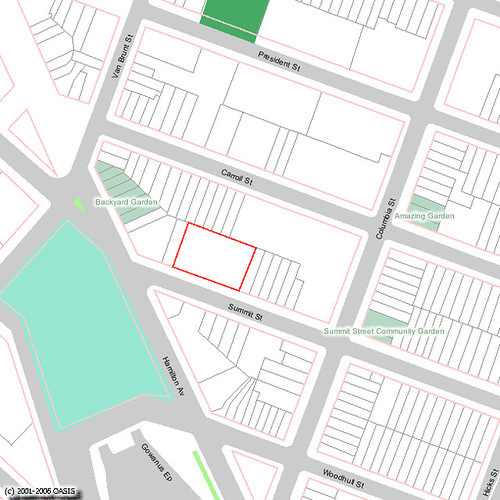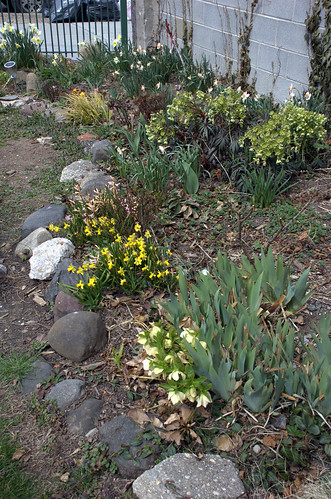[2007.04.05: Corrected some typos.]
[2007.04.02 21:00: Updated with my notes from Saturday’s visit.]
Locations of Gowanus Nursery (red outline) and nearby Community Gardens (labelled light green areas) in Red Hook
A pleasant discovery when I visited Gowanus Nursery on Saturday is that there are three community gardens within one block of each other:
- Summit Street Community Garden, at the corner of Summit Street and Columbia Street
- Backyard Garden, at the corner of Hamilton Avenue and Van Brunt Street
- Amazing Garden, at the corner of Carroll Street and Columbia Street
I was able to visit the first two gardens before and after, respectively, I visited Gowanus Nursery. This post is about the Summit Street garden. I’ll have another for the Backyard Garden.
Let me walk you around the garden, roughly in the order I experienced it.
The garden is surrounded by a simple and attractive green steel fence. A really nice inviting feature is the round, head-sized hole interrupting the vertical bars in the gates. Yes, I tested them; they really are head-sized. You can stick your head through and look around inside without the bars in the way. It’s a simple touch, a grace note, but it says, to me, at least: Sorry we weren’t here when you were. Please come back again.
But the gates were open when I got there. Just inside the gates is a dry-laid bluestone landing area, with dry-laid brick paths guiding you forward. The walls of the adjacent buildings ahead of you are at the North side of the garden. We’ll see the border there in a bit.
I got to meet and speak with two of the gardeners, Kevin King and Claire Merlino. They explained that all the brick and stone used in the garden came from the buildings which used to stand here.
Note to all demolition sites: There is no excuse for throwing out brick and stone in dumpsters destined for landfill. Every garden wants brick and stone. Gardeners, community and others, have lots of creative uses for these durable and attractive materials.
The Rock Garden
To the right of the entrance is the rock garden. Whenever you have to clear a building site for gardening, you will have building debris which is unsuitable for paving, wall-building, and so on. This got piled up near the edge of the property, with the thought that it would eventually get cleared away. As time passed, it also got put to creative reuse, and became a rock garden.
Iris reticulata in the Rock Garden
Erica carnea, Spring Heath, in the Rock Garden
Community in the Garden
The garden got its start in late 1993. The first clean-up was in Spring of 1994. Trash and rubbish had to be removed, but they also needed cleanfill.
There are three building lots here. With the buildings collapsed, there was a large central depression which had to be filled. Gardeners used rocks to tag piles from the nearby Snapple warehouse excavation which they could use for fill in the garden. One of the workers on the site went one better and selected the darkest material he could find and delivered it to the garden; darkest, because it was contaminated with oil from the excavation site. With that teachable moment, the workers came back and removed the “good” stuff and replaced it with the real soil the gardeners had tagged.
Every community garden also needs to balance common and individual planting areas. I like these raised beds as a flexible solution for private planting areas. They’re rectangular with 2:1 proportions; I’m not sure if they’re 4×8 foot or 3×6 foot. Members can subscribe to a full- or half-bed. I also like that the beds are aligned but not on a regular grid, which creates interesting paths through the garden.
Every community garden also needs to coordinate the needs of the garden with the availability of its members. To the left of the entrance is this sign-up station. The book and pencil are protected, and the stand itself is an attractive garden feature.
The West Border
Along Columbia Street is the West Border, one of the common areas.
The North Border
Opposite the entrance on Summit Street, against the adjacent building, is the North Border.
Hellebores and Narcissus in the North border
There seemed to be hundreds of Iris reticulata in bloom when I visited. Claire said that there would have been more except that the squirrels considered them a delicacy and devoured most of what had been planted last fall.
Finally, Claire is looking for someone to adopt this Castor Aralia tree. Leave a comment if you or someone you know is interested.











Oooh… how fun. I definitely am drooling over those stinking hellebores–they’re so much less bouquet-looking than the hybrids, if you know what I mean. And I love that those dark iris are coming up amongst white rock. Great planning there.
I updated the post with my notes. You can read about the “planning” of the rock garden!